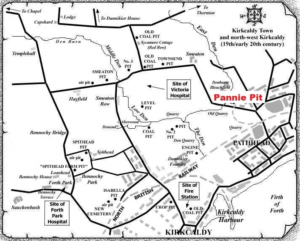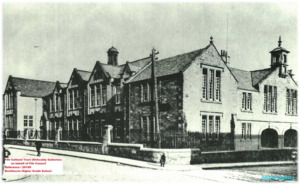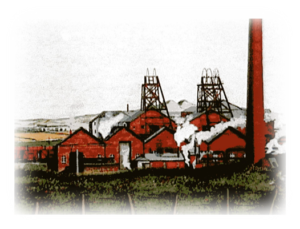From the time Robert left school at the age of 14 he was employed as a miner. Robert worked as a hewer at the Pannie Pit, near his old school at Pathhead. Hewers worked in very confined spaces as they dug out coal with their picks. It did not matter whether the seam was so thin that he could hardly creep into it on hands and knees, or whether it was thick enough for him to stand upright – he was the miner responsible for loosening the coal from the bed. Sometimes the roof that he would pass under was no more than one metre high. It was challenging, exhausting and back-breaking work, with no real mechanical assistance.
Attr: Michael Martin’s Fife Pits & Memorial Book Website www.fifepits.co.uk
Along the coast in Wemyss Parish, the economy had really taken off and this proved a magnet for Robert. He had now had several years’ mining experience and had attended two sessions of Mining Education at Buckhaven Higher Grade School, a very short distance from his place of birth in Station Road. This building would later house Buckhaven Technical College, the original Buckhaven High School then Braehead School.
Attr: Fife Cultural Trust (Kirkcaldy Galleries) on behalf of Fife Council
Robert moved from Dunnikier Colliery to the Rosie Pit between Buckhaven and East Wemyss in 1912/1913.
Attr: Painting of Rosie Pit by George Beckwith
Original Purchased and Presented to Comite Historique Mazingarbe by Bert Hannah
The interdependency of miners forged strong and trusting relationships in the workplace and at leisure. Many miners played sports together and joined mining music groups. Mining companies saw great value in investing in community spirit through participation in these activities.
In his limited leisure time, Robert was an accomplished violin player. Through his lessons with the local hairdresser, Mr Mason, Robert knew that listening, discipline and dedicated practice were key to his improvement as a player. As he moved on to play in orchestras such as the Dysart Gospel Temperance Orchestra that played in the hall in Commercial Street at Pathhead, he developed his ability to work in concert with his fellow musicians. The value of his individual skills was not enough; his role was to blend in as a fully functioning person within a smooth-running and effective team. It wasn’t just about him; it was about them.
These skills and disciplines were even more critical when he started to play cornet in the Dunnikier Colliery Band, which was on an ambitious and upward trajectory from 1908 onwards and wanted to be a prize-winning band. This was reflected in their recruitment of leading conductors and their improving achievements in local and national competitions. In order to win the Scottish Championships, they brought in the doyen of brass band Musical Directors and Conductors, Robert Rimmer.
Robert’s musicianship also had a lighter touch and a fun element. He played at many local social occasions, as part of a quadrille dance band. He was capable of developing positive relationships in many environments.
From other sources it was learned that Robert was also a man of faith. Apart from Gospel Temperance Orchestra, there were newspaper suggestions that he also played in a local YMCA orchestra and went on to play in the Buckhaven PSA (Pleasant Sunday Afternoon) or ‘Brotherhood’ Orchestra, in which he eventually played First Violin.
By the age of 21, Robert Dunsire was a man of many parts.
Newspapers reported that Robert was a popular player in the Buckhaven Hawthorns Juvenile Football team. He was not physically big, but was strong from his work in the pit, and ready to test another set of skills, strength and contribution in yet another situation as a member of a team.
Robert was clearly encouraged and supported at home to make the most of himself and his talents, was a positive individual to have on your side, and had a strong ethical background. Robert could be trusted to work hard, contribute as an individual and team player, and would lead and take responsibility if asked. Mining communities recognised the importance of trust and interdependency required within any work or leisure setting.


